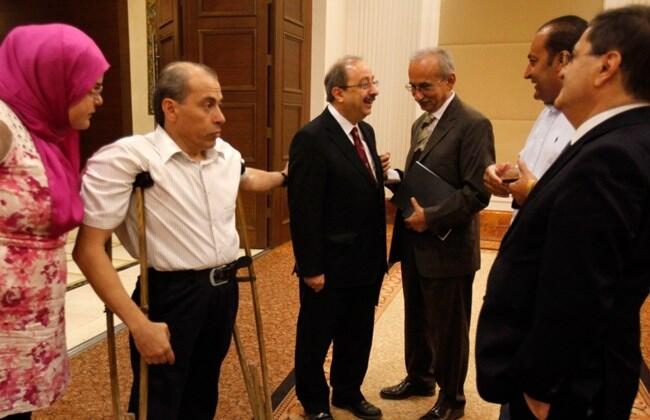Disabled people in Lebanon suffer from a range of difficulties in accessing services such as health care and education, and therefore cannot exercise their basic rights. Several civil society organizations are hoping to help resolve these issues by giving them access to the linchpin of all these problems: information. A report titled “Disability and Access to Information in Lebanon,” which was launched Thursday, outlines why access to information is pivotal for people with disabilities. The report was authored by theLebanese Physically Handicapped Union and Article 19, a London-based human rights organization which focuses on the promotion of free speech and information. Gaining access to information, a prerequisite for all citizens in any functioning state, is an opaque and difficult process in Lebanon. In April 2009 Parliament tabled an access to information draft law that would require all public institutions and some private ones to honor access to information requests and provide explanations to decisions among other things. Disabled people in Lebanon need to know their rights, how and when they should hold the government accountable and information needs to be presented to them in an accessible way, the authors say. Sylvana Lakkis, director of LPHU, highlighted the need for access to information in ensuring that Lebanon’s Law 220 on the Rights of Disabled Persons which was adopted in 2000 is actually implemented. “Whenever we talk about the budget of the government to implement the law 220 … we never get serious information,” Lakkis told The Daily Star. “This hinders us from achieving our rights and complicates our life.” To test the government’s access to information protocols, LPHU sent six different people to six different ministries to ask about the presence of a disability officer responsible for mainstreaming Law 220 into the ministry’s work. None of them received a direct answer. Lakkis said LPHU was also working with the Education Ministry on developing a 12-year plan to make all schools accessible for disabled persons. Their entire collaboration was riddled with misinformation as the Education Ministry informed them of one thing about the budget while the Finance Ministry disagreed. Dr. Maha Damaj, a professor of public health at the American University of Beirut who works on disabled people’s rights in Lebanon, stressed that Law 220 also provides disabled people with rights of which they are often unaware. “If you interview people with disability cards, they don’t actually know what rights they have,” Damaj said. Law 220 entitles disabled people to tax exemptions, parking spots closer to their houses and suitable access to public buildings, among a range of other things. However, many disabled people are unaware of this because the information is often not made public. Information that is made public is rarely disseminated in a way that people with certain disabilities can ascertain. For instance, most things are not translated into braille for the blind. According to the report, 38.2 percent of disabled persons are also illiterate – more than triple the percentage of the general population – so this must also be factored in when raising awareness. High illiteracy rates are tied to the fact that only 8 percent of disabled persons complete secondary or tertiary education, a direct result of the inaccessibility of schools in Lebanon. Edward Thomas of Article 19 said that the importance of ensuring that disabled people are informed extended to all matters. He highlighted judicial procedures and education as key areas in which information should be presented in a way that’s accessible to all. Ensuring that contracts that require signing, and court procedures are interpreted as well as offering examinations in accessible formats is very important, he said. Beyond that, Thomas also highlighted one of the report’s findings: In a school exclusively for deaf students a teacher found that a class of 16-year olds did not know what AIDS was. “That goes back to a really basic problem of getting information across to them. A lot of information gets put out through television, or the radio,” Thomas said. “It’s part of the government’s duties [to get] health information across to people.” Lakkis hopes that the adoption and implementation of the access to information law will open more doors in allowing disabled people to exercise their rights, but she’s weary of Lebanon’s protracted political processes. “I think nothing in this country that is good for people will go through without lobbying,” she lamented. “In this country we’ve learned that unless you’ve made a big noise, things will not be fixed.” Mazin Sidahmed| The Daily Star











